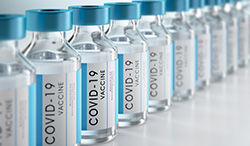 The COVID-19 vaccination roll-out has begun, and there is finally reason to hope that life can return to normal soon.
The COVID-19 vaccination roll-out has begun, and there is finally reason to hope that life can return to normal soon.
We have all made sacrifices in the past year to protect ourselves and others from the virus, whether we’re wearing masks, practicing social distancing, or avoiding large gatherings.
For generations, vaccines have protected the vulnerable across the globe, and have played the ultimate role in greatly diminishing and eradicating some of our deadliest diseases.
The COVID-19 vaccines are no exception. Yet, there remains skepticism about the effectiveness of the vaccines among a segment of the general population.
But here’s the truth: COVID-19 vaccines give us our best shot at beating the pandemic.
If you have doubts, these facts may give you peace of mind:
Vaccines contain ingredients that help your body build immunity against a specific virus. However, not all vaccines have the same ingredients.
The Pfizer and Moderna vaccines are a newer type of vaccine, called mRNA vaccines.
mRNA vaccines don't use live or weakened viruses to build immunity. Instead, they use messenger RNA (mRNA). The mRNA instructs cells to make a harmless piece of the virus's genetic material called the spike protein, which is found on the surface of the coronavirus. This teaches the immune system to recognize and fight the real virus. But because the vaccine doesn't contain any live virus, there's no way it can give you COVID-19.
The vaccine's mRNA does not stay in the body, and it cannot change your DNA.
The Pfizer and Moderna vaccines also lack some other ingredients some people may be concerned about. They do not have:
• Preservatives, such as thimerosal (which contains an organic form of mercury). Most vaccines do not use thimerosal or mercury. And the type of mercury found in the few vaccines that do have thimerosal is not likely to build up in the body. In tiny amounts, it is safe in vaccines.
• Formaldehyde, used to help make some vaccines.
• Eggs, latex or antibiotics. Some people are allergic to these things.
• Microchips. Scientists are not putting microchips in the vaccines to track us. That's a myth. In fact, it's not even possible to do so.
Like all vaccine ingredients, those in the COVID-19 vaccine serve a specific purpose. For instance, some ingredients help the vaccine work. Others are needed to help produce the vaccine.
Some side effects have occurred with COVID-19 vaccines. Most are minor, like a sore arm. A few people have had more serious allergic reactions, but this is very rare. The CDC says that if you have had an allergic reaction to PEG or polysorbate, you should not get an mRNA COVID-19 vaccine. You can help make your shot even safer by telling your provider if you have any allergies or other health problems or have ever had an allergic reaction to a vaccine.